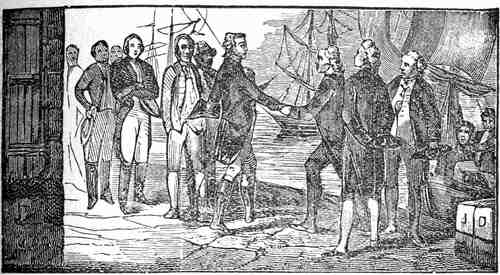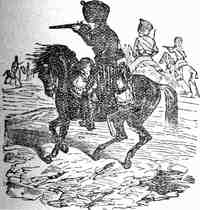Thrilling Incidents In American History
• Preface
Revolutionary War
• Opening Of The Revolution
• The Boston Massacre
• Affair of the Sloop Liberty
• Affair of the Gaspee
• The Tea Riot
• The Boston Port Bill
• The First Continental Congress-Consequent Parliamentary proceedings
• Organization of the Minute-Men
• Patrick Henry-Second Provincial Congress-First Military Enterprise
• Battles of Lexington and Concord
• Battle of Bunker's Hill
• Capture of Ticonderoga
• Second Continental Congress-Washington's Appointment
• Siege of Boston
• Incidents at the Evacuation of Boston
• Burning of Falmouth
• Arnold's Expedition to Quebec
• Siege of Quebec, and Death of Montgomery
• Scenes at Quebec during the Siege
• Expedition against Charleston
• The Declaration of Independence
• The Battle of Long Island
• Washington's Retreat through New Jersey-Capture of General Lee
• Battle of Trenton
• Battle of Princeton
• Capture of General Prescott
• Battle of Brandywine
• Battle of Germantown
• Battle of Red-Bank
• Attack on Fort Mifflin-Retirement of the Army to Valley Forge
• Battle of Bennington
• Murder of Miss M'Crea
• Battle of Stillwater
• Battle of Bemis' Heights, and Retreat of Burgoyne
• Capture of Forts Clinton and Montgomery
• Surrender of Burgoyne
• The Treaty with France
• Attack on Savannah, and Death of Pulaski
• Storming of Stony Point
• General Sullivan's Campaign against the Mohawks
• Tarleton's Quarters
• Battle of Camden, and Death of De Kalb
• Arnold's Treason
• The Loss of the Randolph
• The British Prison-Ships
• Capture of the Serapis
• Putnam's Feat at Horseneck
• Battle of Eutaw Springs
• Wayne's Charge at Green Spring
• Capture of the General Monk
• The Mutinies
• Battle of the Cowpens
• Capture of New London
• Massacre of Wyoming
• Surrender of Cornwallis
War With France
• Capture of L'Insurgente
• The Constellation and Vengeance
War With Tripoli
• Burning of the Philadelphia
• Bombardment of Tripoli
• Loss of the Intrepid
• Expedition of General Eaton
Second War With England
• Battle of Tippecanoe
• Capture of the Guerriere
• Tragical Affair of an Indian Chief
• Battle and Massacre at the River Raisin
• Captain Holmes's Expedition
• Capture of the Caledonia and Detroit
• The Wasp and Frolic
• Gallant Conduct of Lieutenant Allen at the Capture of the Macedonian
• Capture and Destruction of the Java
• Siege of Fort Meigs
• Capture of York, and Death of General Pike
• Defence of Sackett's Harbour
• Defence of Fort Stephenson
• Battle of Lake Erie
• Battle of the Thames
• Gallant Action of Commodore Chauncey under the guns of Kingston Citadel
• The Sacking of Hampton
• Capture of the Peacock
• Massacre at Fort Mimms
• Surrender of Weatherford
• Battle of Niagara
• BattIe of New Orleans
War With Mexico
• Battle of Palo Alto
• Battle of Resaca de la Palma
• Capture of Monterey
• Battle in the Streets of Monterey
• Thrilling Scenes in the Battle of Buena Vista
• Bombardment of Vera Cruz
• Battle of Cerro Gordo
• Battles of Contreras and Churubusco
• Storming of Chapultepec


La Fayette leaving France.
BATTLE OF BRANDYWINE.
 THE commander-in-chief, General Washington, distinctly understood the
nature of
the contest in which he was engaged; and,
sensible of the inferiority of his raw and
disorderly army to the
veteran troops under
Sir William Howe, he
wished to avoid a general engagement; but, aware of the effect which the
fall of Philadelphia would produce on the minds of the people, he determined
to make every effort in order to retard the progress and
defeat the aim of the royal army. Accordingly, he marched to meet General Howe,
who from want of horses, many of which had perished in the voyage, and from
other causes, was unable to proceed from the
head of Elk before the 3d of September, 1777. On the
advance of the royal army, General Washington
retreated across the Brandywine, a stream which falls into a branch of the
Delaware at Wilmington. He took post, with his main body, opposite Chad's Ford,
where it was expected the British would attempt the passage; and ordered
General Sullivan, with a detachment, to watch the fords above. He sent General
Maxwell, with about one thousand light troops, to occupy the high ground on
the other side of the Brandywine, to skirmish with the British, and retard them
in their progress.
THE commander-in-chief, General Washington, distinctly understood the
nature of
the contest in which he was engaged; and,
sensible of the inferiority of his raw and
disorderly army to the
veteran troops under
Sir William Howe, he
wished to avoid a general engagement; but, aware of the effect which the
fall of Philadelphia would produce on the minds of the people, he determined
to make every effort in order to retard the progress and
defeat the aim of the royal army. Accordingly, he marched to meet General Howe,
who from want of horses, many of which had perished in the voyage, and from
other causes, was unable to proceed from the
head of Elk before the 3d of September, 1777. On the
advance of the royal army, General Washington
retreated across the Brandywine, a stream which falls into a branch of the
Delaware at Wilmington. He took post, with his main body, opposite Chad's Ford,
where it was expected the British would attempt the passage; and ordered
General Sullivan, with a detachment, to watch the fords above. He sent General
Maxwell, with about one thousand light troops, to occupy the high ground on
the other side of the Brandywine, to skirmish with the British, and retard them
in their progress.
On the morning of the 11th of September, the British army advanced in two columns; the right, under General Knyphausen, marched straight to Chad's Ford; the left, under Lord Cornwallis, accompanied by the commander-in-chief and Generals Grey, Grant, and Agnew, proceeded by a circuitous route towards the Forks, where the two branches of the Brandywine unite, with a view to turn the right of the Americans and gain their rear. General Knyphausen's van soon found itself opposed to the light troops under General Maxwell. A smart conflict ensued. General Knyphausen reinforced his advanced guard, and drove the Americans across the rivulet, to shelter themselves under their batteries on the north bank and a cannonade was carried on with the American batteries on the heights beyond the ford.
Meanwhile the left wing of the British crossed tho fords above the Forks. Of this movement General Washington had early notice; but the information which he received from different quarters, through his raw and un practised scouts, was confused and contradictory, and consequently his operations were embarrassed. After passing the fords, Lord Cornwallis took the road to Dilworth, which led him on the American right. General Sullivan, who haJ been appointed to guard that quarter, occupied the heights above Birmingham church, his left extending to the Brandywine, his artillery judiciously placed, and his right flank covered by woods. About four in the afternoon Lord Cornwallis formed the line of battle and began the attack: for some time the Americans sustained it with intrepidity, but at length gave way. When General Washington heard the firing in that direction, he ordered General Greene with a brigade to support General Sullivan. General Greene marched four miles in forty-two minutes, but, on reaching the scene of action, he found General Sullivan's division defeated and fleeing in confusion. He covered the retreat; and, after some time, finding an advantageous position, he renewed the battle, and arrested the progress of the pursuing enemy.
General Knyphausen, as soon as he heard the firing of Lord Cornwallis's division, forced the passage of Chad's Ford, attacked the troops opposed to him, and compelled them to make a precipitate retreat. General Washington, with the part of his army which he was able to keep together, retired, with his artillery and baggage, to Chester, where he halted, within eight miles of the British army, till next morning, when he retreated to Philadelphia. Night, and the exhaustion of the British troops, saved the discomfited Americans from pursuit.
In Philadelphia the American commander-in-chief remained two days, collecting his scattered troops, replacing the stores lost in the battle, and making arrangements for his future movements. On the third day after the engagement he marched up the north side of the Schuylkill, crossed it at Swede's Ford, and proceeded towards Lancaster.
In the battle of the Brandywine the Americans suffered considerable loss, having
about three hundred men killed, six hundred wounded, and four hundred taken
prisoners. They also lost ten small field-pieces and a howitzer. The loss of the
British was much less, not exceeding five or six hundred killed and wounded. In
the battle several foreign officers of distinction served in the American army:
among these was the celebrated Marquis de la Fayette; he was only about twenty
years of age, and, animated by a youthful and enthusiastic love of liberty, had
quitted his country, a plentiful fortune, and all the endearments of polished
society, to fight under the banners of the infant republic at the most gloomy
period of the contest. At his own expense he purchased and fitted out a vessel
to convey him to the American continent, and sailed, notwithstanding a
prohibition of the French government, which did not then deem it expedient to
throw off the mask. This
battle was his first military service in the American cause, and in it he
received a wound in the leg, but did not leave the field. Some other French
officers were in the battle on the same side, and also Count Pulaski, a
Polish nobleman.